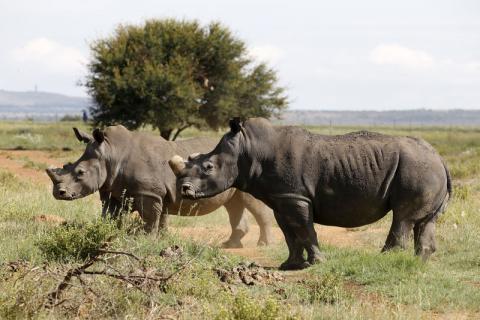Advertisement
After a long journey, 16 rare black rhinos make a new home in eSwatini
MBABANE (Reuters) - A group of 16 endangered black rhinos has been moved over 700 kilometres from poaching hotspot South Africa to an "ideal" - and safer - habitat in eSwatini, the eSwatini national wildlife authority said on Thursday.
The rhinos include adult breeding bulls and cows, young adults and calves. They came from a private game reserve in South Africa, where the cost of protecting them from poachers was rapidly becoming unsustainable, the wildlife authority said.
Once dehorned, they were released in eSwatini, formerly Swaziland, earlier in July.
"Many delays were experienced ... especially with respect to the bureaucratic nightmare of issuance and re-issuance of permits," said Ted Reilly, chief executive of Big Game Parks, eSwatini's national wildlife authority.
"With all 16 rhinos safely captured in South Africa and transported over 700 km across an international border, dehorned and safely released into prime habitat, the second and most arduous phase of monitoring and security has begun," Reilly said.
Only some 5,000 black rhinos are left globally, the authority said. About 20,000 are left of all species. About 80% live in South Africa, but it has lost over 8,000 rhinos to poaching since 2008, according to Big Game Parks.
Landlocked between South Africa and Mozambique, eSwatini is much safer. It has lost just three rhinos in the past 26 years, the statement said.
Nevertheless, anti-poaching measures have been stepped up since the black rhinos arrived, Big Game Parks said. The rhinos were being monitored closely to ensure any problems were quickly identified and the rhinos had found water and settled in to their new home.
(Reporting by Lunga Masuku; editing by Emma Rumney, Larry King)



















Add new comment